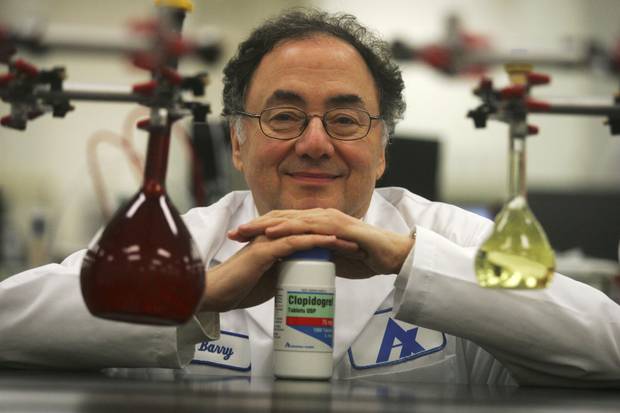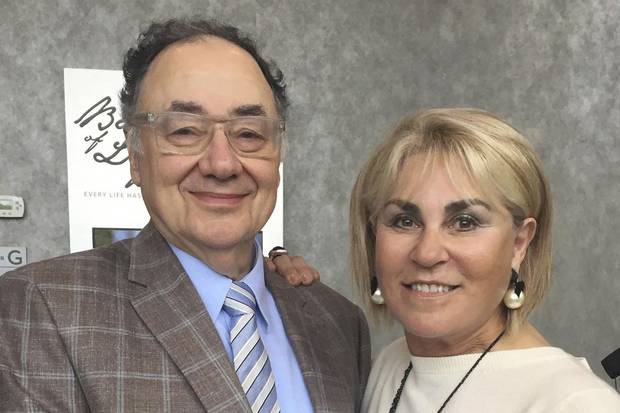The basics
How they were found: Early in the morning on Dec. 15, a real estate agent found Barry and Honey Sherman's bodies in the basement of their multimillion-dollar Toronto mansion at 50 Old Colony Rd., which the couple had put up for sale. At a Jan. 26 news conference, the lead detective confirmed that the two were found on their pool deck, clothed in a "semi-seated position," hanging from belts tied to a railing. Police say there was no sign of forced entry to the home.
How they died: On Dec. 17, police confirmed the cause of death as "ligature neck compression." At the time, multiple media reports and a police source said investigators' initial theory was that Mr. Sherman might have killed his wife and then himself, but the family strongly disputed this. Then at the Jan. 26 news conference, police announced at a news conference that they now believed the Shermans were targeted and their deaths were a double homicide, but added that there were no suspects. Shortly after, the family said it had anticipated the case would be deemed a homicide: "This conclusion was expressed by the family from the outset and is consistent with the findings of the independent autopsy and investigation."
Who's investigating this: Homicide detectives have been in charge of the case since December, with Detective Sergeant Susan Gomes as lead investigator. In addition, the Shermans hired Brian Greenspan as a lawyer for the family, who in turn hired former homicide detectives Michael Davis and Tom Klatt as private investigators.

Dec. 15: Police tape surrounds the Shermans’ home the day they were found dead.
CHRISTOPHER KATSAROV/THE CANADIAN PRESS
Who they were
Bernard (Barry) Sherman
- Age: 75
- Business: Mr. Sherman was the founder of pharmaceutical giant Apotex. He started the company in 1974 and built it to become the largest Canadian-owned drug company. (Learn more about Mr. Sherman’s career and legacy in Paul Waldie’s obituary.)
- Wealth: Mr. Sherman amassed a vast fortune, recently estimated by Canadian Business magazine at $4.77-billion, making him the 15th richest person in the country. (Learn more about how Mr. Sherman built his fortune in a 2007 Globe profile by Paul Waldie and Andy Hoffman.)
Honey Sherman
- Age: 70
- Philanthropy: The Shermans were among Canada’s most generous philanthropists. Ms. Sherman was a member of the board of the Baycrest Foundation and the York University Foundation. She also served on the boards of Mount Sinai’s Women’s Auxiliary and the Simon Wiesenthal Center.
What the family says
The Shermans have four children and several grandchildren. The Shermans' son Jonathon gave a tearful eulogy at the public memorial for his parents, where he described the emotional toll their deaths have taken:
These last few days have been really fucked up for my family. ... I kept expecting my parents to walk through the front door and say, 'Everything will be fine.'

August, 2006: Barry Sherman is shown with a container of clopidogrel bisulfate, a generic drug for heart disease then newly approved by the U.S. Food and Drug Administration. The drug was at the centre of a years-long patent feud between Mr. Sherman’s company, Apotex, and Bristol-Myers Squibb, maker of the brand-name equivalent Plavix.
JIM ROSS/THE GLOBE AND MAIL
The company he built
Mr. Sherman's death has caused grief at the generic-drug giant he founded, which is trying to find its way in a rapidly changing pharmaceutical industry.
Over 43 years, Mr. Sherman and Apotex made billions by reverse-engineering brand-name drugs, reproducing them and selling the cheaper alternatives. Today, the company has more than 10,000 people in research, development, manufacturing and distribution facilities worldwide, with more than 6,000 employees at its Canadian operations. Filling more than 89 million prescriptions in a year and exporting to 115 countries, the privately-held company says its worldwide sales exceed $2-billion a year.
But the company is under pressure on multiple fronts:
- Industry upheaval: Governments, health providers and regulatory agencies want more generic drugs at a lower cost, pinching profits and intensifying competition between the pharmaceutical firms supplying those drugs. Mr. Sherman, the company’s chief formulation officer, was key to designing almost every dose formulation Apotex brought to market and specialized in getting out generic alternatives to brand-name drugs before anyone else. His death could be a serious setback to the company’s future plans.
- Litigation: Over the years, Apotex has faced down major legal challenges from Big Pharma companies, notably a 2006 lawsuit from Bristol-Myers Squibb to stop their generic form of a heart-disease drug. Mr. Sherman regularly sued rival companies and governments to protect Apotex’s patents. But he also struggled with legal action from family members alleging they had been cut out of the company.
Now, Apotex has a third challenge: Leadership. That took another twist on Jan. 26, when the company announced the resignation of its president and CEO, Dr. Jeremy Dasai, saying only that he quit "to pursue other opportunities."

Dec. 21: The caskets arrive during a memorial service for the Shermans in Mississauga.
NATHAN DENETTE/THE CANADIAN PRESS

Dec. 21: Toronto Mayor John Tory, Ontario Premier Kathleen Wynne and Prime Minister Justin Trudeau arrive at the Shermans’ memorial.
NATHAN DENETTE/THE CANADIAN PRESS
The outpouring of grief
The couple's death was met with heartfelt tributes from the political, business and charitable leaders Mr. Sherman befriended in his long career. Toronto's Jewish community mourned the philanthropists' death, with a memorial page set up by the United Jewish Appeal Federation of Greater Toronto receiving scores of remembrance messages. On Dec. 21, thousands gathered to pay their respects at a funeral service at Mississauga's International Centre.
Sophie and I are saddened by news of the sudden passing of Barry and Honey Sherman. Our condolences to their family & friends, and to everyone touched by their vision & spirit.
— Justin Trudeau (@JustinTrudeau) December 16, 2017
I am beyond words right now. My dear friends Barry and Honey Sherman have been found dead. Wonderful human beings, incredible philanthropists, great leaders in health care. A very, very sad day. Barry, Honey, rest in peace.
— Dr. Eric Hoskins (@DrEricHoskins) December 15, 2017
Two weeks ago it gave me immense joy to present a Senate medal to one of the kindest and most beloved members of Canada’s Jewish community. Today I am gutted by the loss of Honey and Barry Sherman. Our community is steeped in grief. I am heartbroken. pic.twitter.com/B8VANUiNbW
— Senator Linda Frum (@LindaFrum) December 15, 2017
Deeply shocked to learn of the deaths of Honey and Barry Sherman, such remarkable people. Grappling with this terrible news.
— Bob Rae (@BobRae48) December 15, 2017
Deeply shocked & saddened to hear of the deaths of Barry & Honey Sherman. Philanthropists and entrepreneurs who made our province a better place to live.
— Brad Duguid (@BradDuguid) December 15, 2017
With reports from Paul Waldie, Kelly Grant, Tu Thanh Ha, Andrew Willis, Tim Kiladze, Alexandra Posadzki, Josh O'Kane, Kelly Grant, Jeff Gray, Joe Friesen, Molly Hayes, Susan Krashinsky Robertson and The Canadian Press

